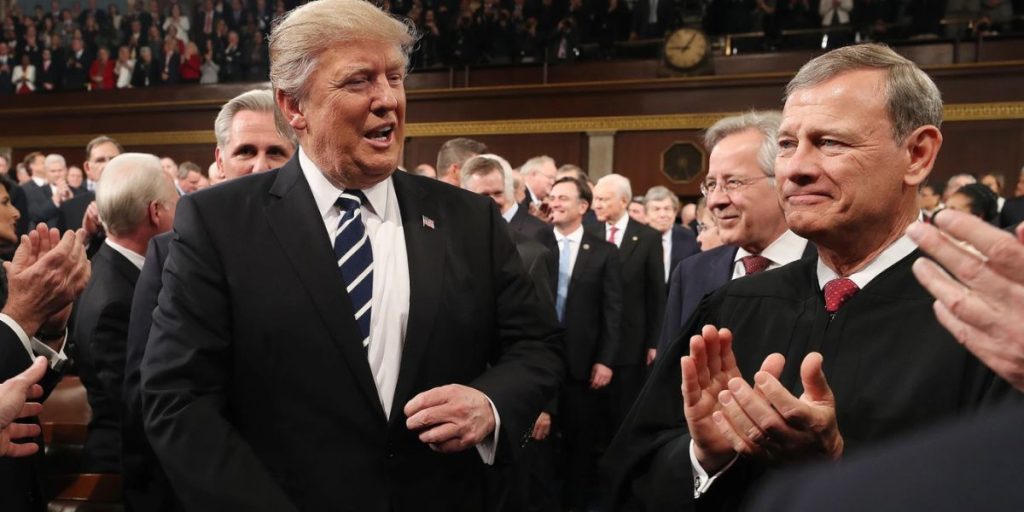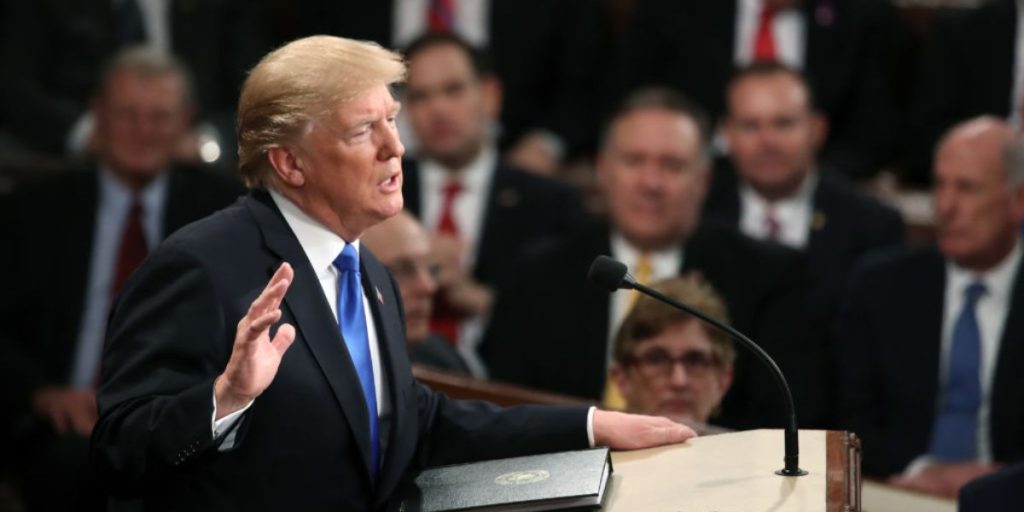In December 1868, Chief Justice Salmon Chase ruled in a packed courtroom in Richmond, Virginia, the former Confederacy’s capital, that Jefferson Davis, the defeated rebel president, should not face treason charges.
Little did anyone know at the time that Chase’s decision—along with another he authored the following year that touched on the same legal issue but reached a different conclusion—would resurface from the mists of history to play a role in the ongoing debate over whether former President Donald Trump should be barred from office.
Both Chase cases—the other involving a Black man trying to overturn his felony conviction—are referenced in court filings ahead of the Supreme Court’s oral argument in Trump’s case next week. Chase was sitting on a lower court in each case, therefore he was not functioning as the Supreme Court’s top justice.
Both contain a rare current discussion of Section 3 of the newly enacted 14th Amendment to the Constitution.

The rule was designed to prevent former government officials who joined the Confederacy from obtaining office after the Civil War. It specifies that people who previously swore an oath to support the Constitution but later “engaged in insurrection or rebellion” are unable to serve again.
Chase’s opinions have gained new relevance as the Supreme Court considers Trump’s request that he not be removed from the Republican primary ballot in Colorado. He is attempting to overturn a Colorado Supreme Court decision that stated he is disqualified under Section 3 due to his role in attempting to reverse the 2020 presidential election results, which resulted in the Jan. 6, 2021, attack on the Capitol.
“I don’t know that any one case or any one justice from the past is going to be the dominant kind of theme or talisman that the court looks at,” said Vikram Amar, a professor at the University of California Davis School of Law, who filed a brief mentioning Chase’s decisions.
He went on to say, “If you’re trying to convince people about the understanding of the day, you want to make sure that you’re addressing what prominent people said and did back then.”
The background is significant in part because several members of the conservative-majority Supreme Court emphasized how people would have interpreted constitutional provisions at the time they were drafted.
Chase, an anti-slavery Republican former governor of Ohio, was appointed to the Supreme Court by President Abraham Lincoln in 1864. He also had presidential ambitions. He considered running for president while serving as chief justice, and historians claim his decisions were influenced by political factors.
Chase was attempting to obtain the Democratic presidential nomination at the time Davis’ case came before him, but that effort had failed before he voted against proceeding with the prosecution.
Cynthia Nicoletti, a professor at the University of Virginia School of Law who wrote a book about Davis’ prosecution, said in an interview that Chase’s argument in the Davis case was a “weird one” motivated by political expediency.
“I do think it’s a clever maneuver for Chase to get rid of the case,” she went on to say.
Chase appeared to support Davis’ lawyers’ contention that Section 3, which clearly applied to the former Confederate president, was a kind of punishment, therefore precluding criminal prosecution.
The lawyers claimed that Section 3 was “self-executing,” which meant that it applied to Davis without Congress passing any legislation to execute it.
Historians have concluded that Chase had privately urged Davis’ lawyers make that argument.
But the following year, Chase took the opposite approach in another Virginia case, this time involving a Black criminal defendant, Caesar Griffin, who claimed that his conviction for “shooting with intent to kill” should be overturned because the judge who presided over his case was a Confederate.
Griffin maintained that Section 3 applies to the judge because he had previously taken an oath to support the Constitution while serving in the Virginia state assembly.
This time, Chase ruled that “legislation by Congress is necessary” for someone to be disqualified under the 14th Amendment, citing the far-reaching implications of invalidating thousands of decisions made by officials with similar Confederate backgrounds to the judge in Griffin’s case.
The question of how Section 3 can be enforced is one of numerous legal questions presented in Trump’s case, and it could have far-reaching repercussions if other states follow Colorado’s lead and remove him from the ballot.
In their briefing, Trump’s lawyers cite Chase’s opinion in the Griffin case, claiming that it confirms “congressional enforcement legislation as the exclusive means of enforcing Section 3.” It is only one of several reasons they believe the Colorado verdict should be overturned.
The plaintiffs, six Colorado voters, said in their own brief that Chase’s decision is “non-binding” and “does not credibly support the claim that Section 3 is unenforceable here.”

They also noted Chase’s “contradictory position” in the Davis case.
The Colorado Supreme Court ruled that Chase’s decision in what has become known as “Griffin’s Case” was not compelling, while Justice Carlos Samour relied significantly on it in dissent.
“I consider the holding in Griffin’s Case compelling,” he wrote in a statement.
Josh Blackman, a professor at South Texas College of Law who filed a brief supporting Trump, agrees, claiming that the Griffin decision clearly resolves the problem of how Section 3 is applied.
If the Supreme Court wants to handle Trump’s case without diving into the meaning of “insurrection” under Section 3, “I think Griffin’s Case is one way of doing it,” he said. Chase’s vote in the Davis case is less significant, Blackman added, in part because a full summary of the verdict was published years later.
Other legal experts strongly disagree with Blackman’s reliance on the Griffin decision.
“Chief Justice Chase was not shooting straight” while deciding either case involving Section 3, William Baude and Michael Paulsen stated in an influential law review article arguing the provision is self-executing.
Ellen Connally wrote a comprehensive article about Davis and Chase when she was pursuing a Ph.D. in history at the University of Akron 20 years ago. Her work, like Nicoletti’s, is cited in the Trump lawsuit papers.
Connally believes the court should examine the history extensively, but admits that in the Davis case, “Chase was just looking for this loophole” to avoid some serious legal concerns that would come if the case went forward, she said.
Chase’s decision ended up having little practical application.
He was on a two-judge panel, and the second judge did not believe the prosecution should be overturned. Because of the tie vote, the case was initially sent to Chase’s own Supreme Court under the regulations in effect at the time.
But there was another twist. On December 25, 1868, outgoing President Andrew Johnson declared an amnesty for all Confederates, including Davis.
The prosecution was withdrawn.